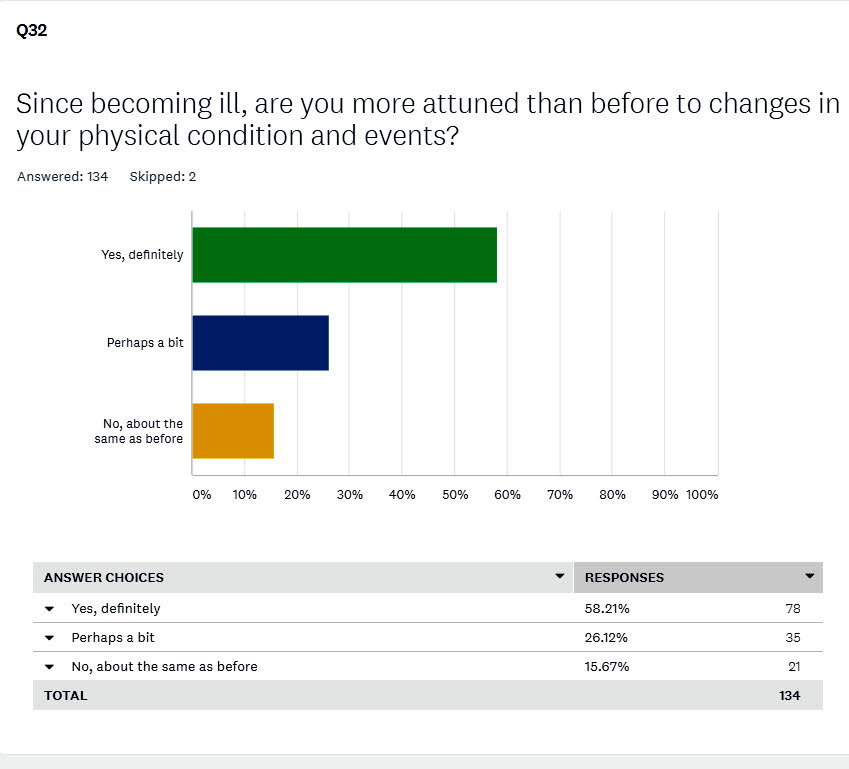Q. 32 - Are you currently more attuned to changes in physical status ?
LTCOVID.com
Thanks for visiting!
To translate this page, select your
language from the dropdown menu below:
2 respondents skipped this question.
A strong majority said that they were more attuned (58.21%), especially if combined with the "perhaps a bit" response (26.12%) to give 84.33%.
Perhaps with any illness, we sense or intuit more quickly, changes in our body's state, than when in good health. Apparently 16% of respondents might disagree.
One might also guess that living with an illness for a prolonged time, an average of 6.5 months for this sample, as we have already presented, might contribute as well to "getting to know" one's illness through its effects. Any new sensations might be quickly studied to compare with the new baseline which is this "long-term" COVID-19 state. That too might be viewed as a form of training to spot changes when they occur. The strong majority response suggests that something like this is going on.
Does this response suggest another possibility?
Is this a "looking too closely" at one's physical condition? A form of hyperchondriasis perhaps?
Is this implying a form of hypervigilance as commonly seen in anxiety and panic disorders?
How would one identify this?
Are the specific symptoms or the number of symptoms reported, different in the majority and minority response groups for this question? Again, such distinctions will be pursued after presenting the totality of responses from our sample.
But here's one example: a look at symptoms that respondents were living with before becoming ill.
The 79 who indicated that they were More Attuned to bodily changes since becoming ill, had fewer symptoms before becoming ill.
The 21 who responded "No about the same as before" for noticing bodily changes, had more symptoms before becoming ill.
Having begun from a place of more bodily discomforts, (more symptoms), do they simply notice less when this viral illness imposes even more changes? Are they simply more used to being uncomfortabe?
But first, is this a real difference?
Here is the result of comparing these means of symptoms before becoming ill.
t-test: 2.0693 df = 98 S.E. of diff. = 1.243 p = 0.0412
So this is a statistically significant difference. If the hypothesis is that there is no difference between these mean symptoms before, and that these values arose by some accident or chance ...
Well there are only 4 chances in 100 that that's true.
So where should we go with this result?
Often one finds, and increasingly so, a sense that the "long-term" COVID-19 patients are part of a group.
They are the "long-haulers" club. They must stick together to gain power and advocacy to avoid being ignored.
Those goals are certainly valid.
But out of the result just seen here, one should also conclude that those with this illness are often different. They are individuals, and should be approached as such. Otherwise, sharing anecdotes and recommendations online for interpretations of tests, symptoms, and "successful" therapies for such symptoms, just might lead to disasters for certain individual patients.
Other differences like these, that identify subgroups of our larger sample, and that again underscore through statistical control of results, that each patient is an individual, and not a photocopy of a stereotype, will be presented subsequently.
A découvrir aussi
- Q.1 & Q.2 : DOB & Age
- Q. 20 - Date diagnosed with the COVID-19 illness
- Q. 30 - A typical day at present includes ...



